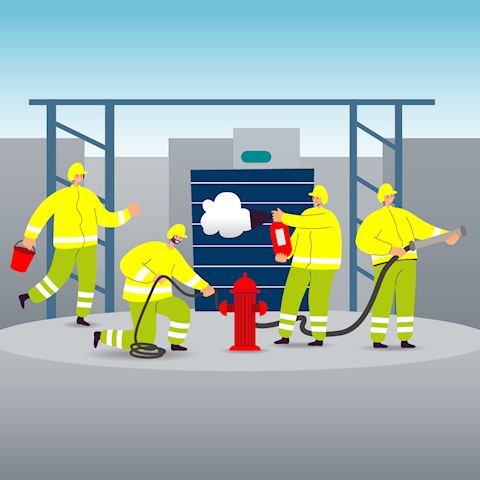
Navigating the rise of technology in construction
In this article we’ll dive into the booming world of smart construction technology, exploring the innovations driving the change and what the future looks like for the industry.

The dramatic rise in social media accounts during the pandemic is increasing the risk of reputational damage for brands. One in five PR disasters now breaks on Twitter. So what’s the best way to defuse a PR crisis – and how do you avoid one in the first place?
Good PR builds loyalty. Customers come back to you again and again because of the values, attributes, behaviour and narrative that they associate with your company. But as Warren Buffett so pithily observed: “It takes 20 years to build a reputation and five minutes to ruin it.” And when things do go wrong, the news can spread like wildfire.
Social media accounts increased 50% in the pandemic – making almost all of us publishers, able and willing to share our outrage when a brand disappoints us. Already, 2021 has seen several major brands trip up badly.
European Super League
The botched attempt by 12 of Europe’s biggest football clubs to create a Super League is widely acknowledged as a PR fiasco. The clubs’ mistakes? No briefings for players or managers so they weren’t on side; no stakeholder engagement with fans; and no clear explanatory statement – the press release issued at midnight and refusal to field a spokesperson just added to the sense of confusion.
Sports Direct
Owner Mike Ashley’s attempt to keep Sports Direct stores open during the first lockdown backfired spectacularly and ended in a humiliating U-turn. As Ashley himself admitted, communications to both employees and the public were poor and the attempt to win exemption for Sports Direct ill-judged.
BrewDog
The recent open letter posted on Twitter by ex-employees shows the perils of not fostering an encouraging working environment. In the letter, former staff alleged that the company fostered a culture of fear. BrewDog was quick to offer an apology and promised to ‘listen, learn and act’. But its hard-won reputation has undoubtedly suffered – how much depends on the actions it now takes.
It’s easy to think that the fate suffered by the likes of Sports Direct and BrewDog couldn’t happen to your company. But the fact is, it could. Injudicious late-night tweets; an insensitive post on Instagram; clumsy internal comms – all can damage your reputation and damage the trust you’ve spent years nurturing. So if a PR crisis breaks without warning, what’s the best way to manage it and minimise reputational damage? Here are five steps to navigate the storm.
1. Think first
You need to act fast – but not so fast you don’t have time to consider and reflect. Avoid knee-jerk reactions and don’t lash out. But don’t offer ‘no comment’ either as this can come across as weak and defensive.
2. Make a clear plan
Gather intelligence and find out exactly what’s happened. Establish your position. Then devise a clear, well thought-out strategy and brief your team. Your response should be authentic and demonstrate empathy. It should also be bespoke – there’s no ‘one size fits all’ approach to a PR crisis.
3. Craft your message
Strike the right tone. Make sure you own responsibility and address the problem sincerely. Then get your message out fast to the affected parties. These could include employees, stakeholders, business partners, customers and the media. Use all appropriate channels – your website, social media, press, broadcast, internal comms.
4. Monitor and adapt
You can’t predict how a PR crisis will unfold. So make sure you’re ready to react fast as new developments occur. Establishing a dedicated 'response team' can often help expediate any action.
5. Review and learn
Experience shows us that our personal mistakes are an opportunity to learn and grow. A PR crisis is no different. Look at what you can do better as a company in the light of what’s gone wrong. Turn your learning into real, measurable action.
In some cases, the best you can hope for when a PR disaster hits is to weather the storm and minimise the damage. But occasionally you can emerge stronger than ever. KFC’s wit and humility when its UK stores ran out of chicken helped it turn a crisis into a PR triumph.
While it’s good to be able to defuse a PR crisis, it’s even better to prevent it happening in the first place. You may not be able to avoid a PR crisis altogether but you can minimise the risk and the scale of damage if it does happen. Here’s how:
1. Develop a PR crisis plan
By definition, a PR disaster will take you by surprise. So it’s useful to have a response plan in place. You won’t be able to cover all the bases (you don’t have a crystal ball!) but you can include information like contact details for relevant people, who’s responsible for certain areas, and step-by-step responses to specific incidents that could predictably happen e.g. a product recall.
2. Draw up social media guidelines
As already highlighted, social media can be the spark that lights the fire. So draw up some best practice guidelines to help your team and senior managers, even when they’re tweeting or posting in a personal capacity.
3. Cultivate your brand
Careful nurturing of your brand will go a long way to helping you recover if a PR storm does blow up. If your brand reputation is already strong, people are more likely to forgive you and cut you some slack.
4. Monitor your reputation continuously
Know what people are saying about you and adapt as necessary. If your finger is on the pulse, you can spot when things start to change and act fast before the odd negative post becomes a tide of disapproval.
5. Be honest and authentic
Always remain closely aligned to your core brand values.
6. Put the customer first
Offer excellent service (always!). And listen to what your customers say, addressing any concerns or gripes.
7. Don’t forget internal comms
As BrewDog’s experience shows, your brand’s internal culture is crucial. You need your employees to live and breathe your brand values. So treat them with respect and make sure they feel informed about company developments.
8. Understand your audience
Step into your audience’s shoes. The better you understand them, the less likely you are to offend them.
Don’t think ‘it can’t happen to us’. A PR crisis can happen to anyone, so be prepared. Nurture and monitor your brand so that if the worst does happen, you’re working from a position of strength and knowledge. If, despite your best efforts, you do find yourself in the middle of a PR storm, respond in a calm, measured way. Make sure you know all the facts and then get your message out fast with a multi-channel response that takes responsibility and shows empathy.
If you need help developing a plan to prevent and/or mitigate the impact of a PR disaster, get in touch with Principal Director, Rachel Arquati: r.arquati@clearb2b.com / 01285 626000.



In this article we’ll dive into the booming world of smart construction technology, exploring the innovations driving the change and what the future looks like for the industry.

Learn how to use presentation opportunities as an effective lead-generation tool in your trade show activity.

Great marketing success comes from keeping your communications focused, engaging and simple to ‘get’ - but that isn’t always so simple to achieve.

With multiple types of technologies being considered, we bring you a snapshot of alternative fuels and review the most prominent pros and cons for each one.